BUACC5933, Sem 2, 2019: Accounting & Sustainability Practices
VerifiedAdded on 2022/11/10
|7
|1364
|151
Report
AI Summary
This report delves into the crucial role of the accounting profession in fostering corporate social responsibility (CSR) and sustainability practices. It examines how accounting bodies like CPA Australia and ICAA in Australia are driving sustainability reporting through initiatives such as Environmental Management Accounting (EMA) and triple bottom line reporting. The report highlights the Australian conceptual framework's focus on providing relevant and reliable financial and non-financial information to stakeholders. The report further analyzes the CSR and sustainability practices of BHP Billiton, a leading resources company, including its sustainability reporting, environmental impacts, and responses to environmental damage. The analysis covers the company's efforts to address climate change and support local communities. The report concludes that accounting plays a vital role in promoting transparency and accountability in corporate operations concerning sustainability, with the objective of moving away from short-term profits that endanger the environment. The report is based on the provided assignment brief for BUACC5933 course, Semester 2, 2019.
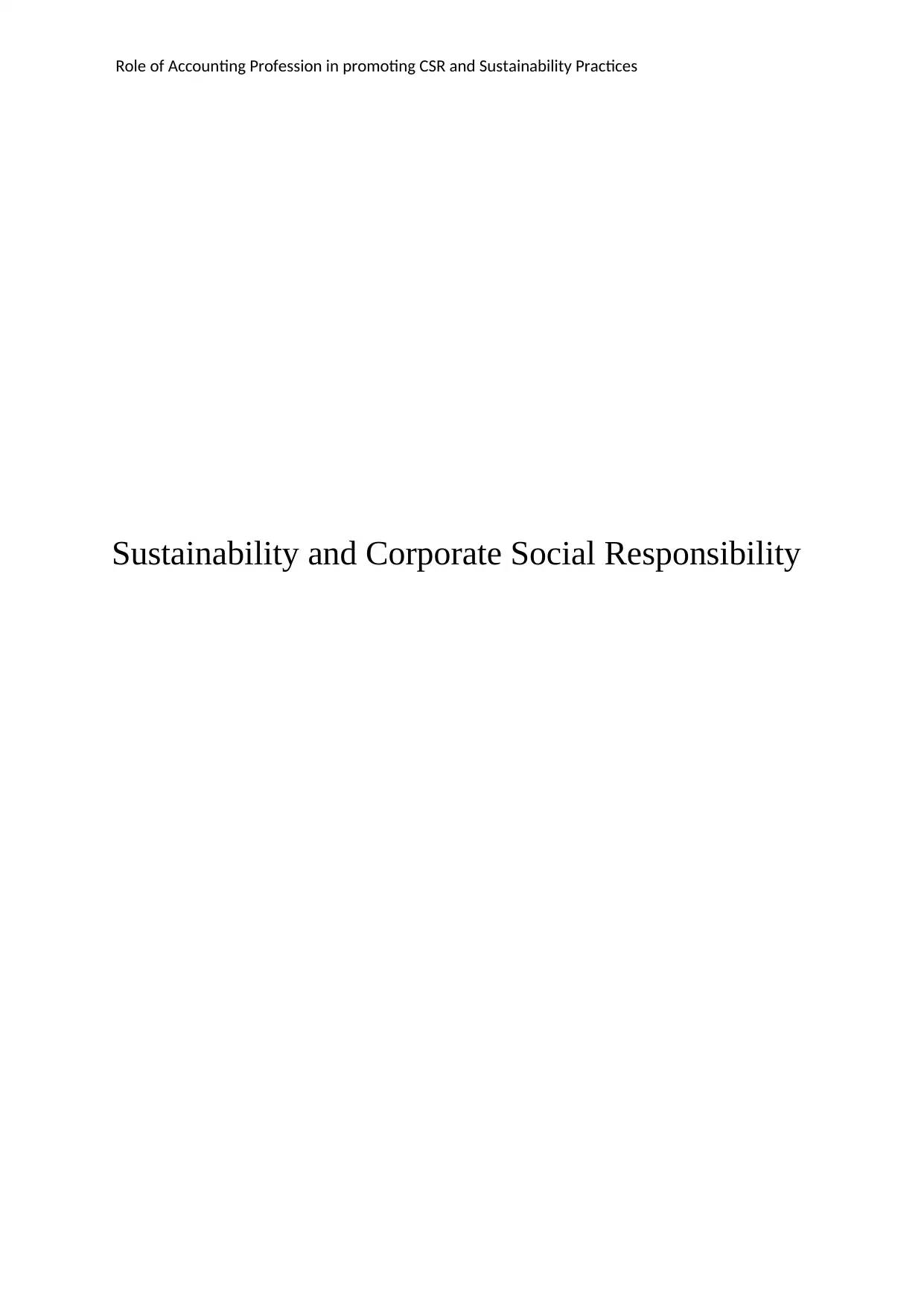
Role of Accounting Profession in promoting CSR and Sustainability Practices
Sustainability and Corporate Social Responsibility
Sustainability and Corporate Social Responsibility
Paraphrase This Document
Need a fresh take? Get an instant paraphrase of this document with our AI Paraphraser
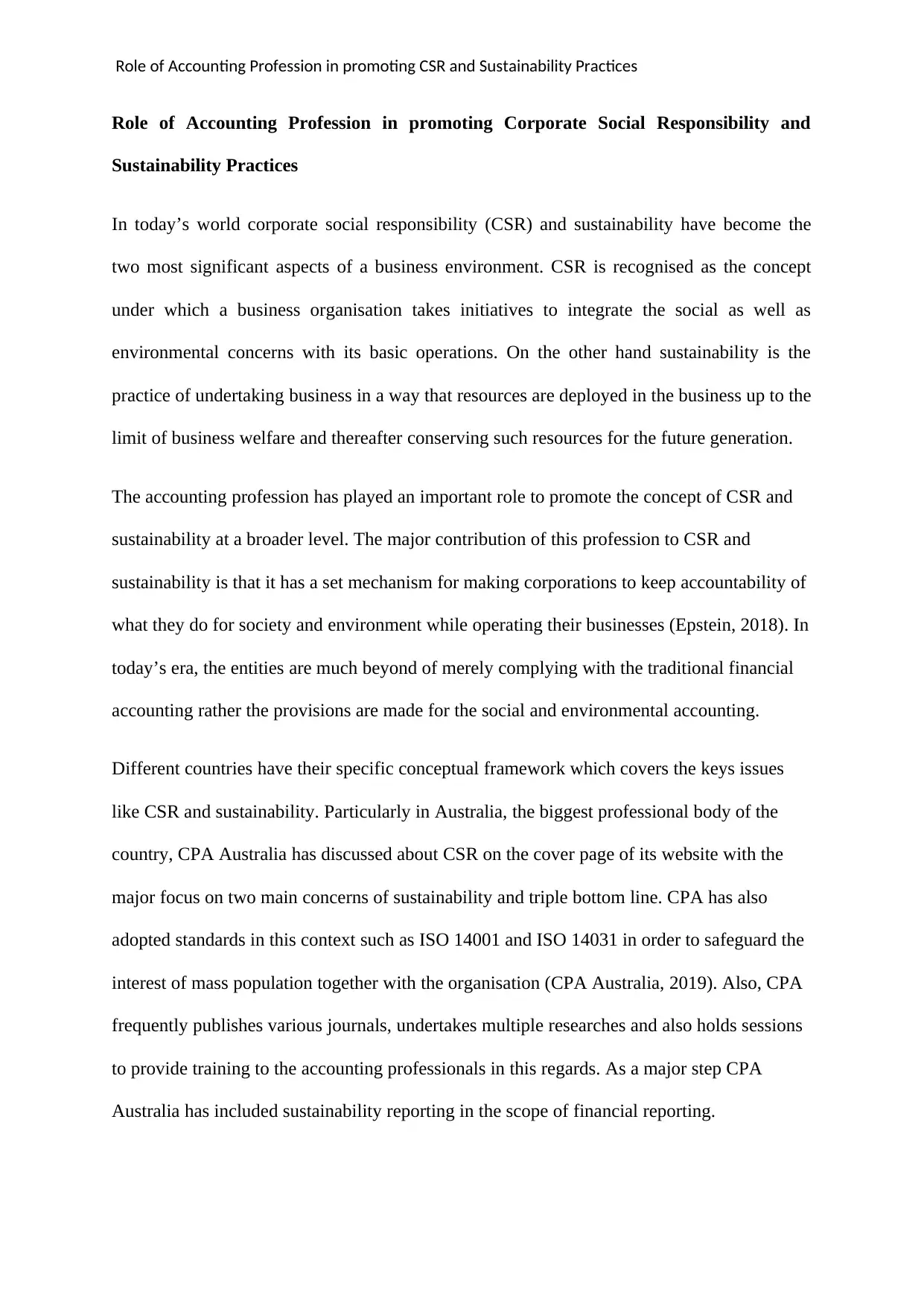
Role of Accounting Profession in promoting CSR and Sustainability Practices
Role of Accounting Profession in promoting Corporate Social Responsibility and
Sustainability Practices
In today’s world corporate social responsibility (CSR) and sustainability have become the
two most significant aspects of a business environment. CSR is recognised as the concept
under which a business organisation takes initiatives to integrate the social as well as
environmental concerns with its basic operations. On the other hand sustainability is the
practice of undertaking business in a way that resources are deployed in the business up to the
limit of business welfare and thereafter conserving such resources for the future generation.
The accounting profession has played an important role to promote the concept of CSR and
sustainability at a broader level. The major contribution of this profession to CSR and
sustainability is that it has a set mechanism for making corporations to keep accountability of
what they do for society and environment while operating their businesses (Epstein, 2018). In
today’s era, the entities are much beyond of merely complying with the traditional financial
accounting rather the provisions are made for the social and environmental accounting.
Different countries have their specific conceptual framework which covers the keys issues
like CSR and sustainability. Particularly in Australia, the biggest professional body of the
country, CPA Australia has discussed about CSR on the cover page of its website with the
major focus on two main concerns of sustainability and triple bottom line. CPA has also
adopted standards in this context such as ISO 14001 and ISO 14031 in order to safeguard the
interest of mass population together with the organisation (CPA Australia, 2019). Also, CPA
frequently publishes various journals, undertakes multiple researches and also holds sessions
to provide training to the accounting professionals in this regards. As a major step CPA
Australia has included sustainability reporting in the scope of financial reporting.
Role of Accounting Profession in promoting Corporate Social Responsibility and
Sustainability Practices
In today’s world corporate social responsibility (CSR) and sustainability have become the
two most significant aspects of a business environment. CSR is recognised as the concept
under which a business organisation takes initiatives to integrate the social as well as
environmental concerns with its basic operations. On the other hand sustainability is the
practice of undertaking business in a way that resources are deployed in the business up to the
limit of business welfare and thereafter conserving such resources for the future generation.
The accounting profession has played an important role to promote the concept of CSR and
sustainability at a broader level. The major contribution of this profession to CSR and
sustainability is that it has a set mechanism for making corporations to keep accountability of
what they do for society and environment while operating their businesses (Epstein, 2018). In
today’s era, the entities are much beyond of merely complying with the traditional financial
accounting rather the provisions are made for the social and environmental accounting.
Different countries have their specific conceptual framework which covers the keys issues
like CSR and sustainability. Particularly in Australia, the biggest professional body of the
country, CPA Australia has discussed about CSR on the cover page of its website with the
major focus on two main concerns of sustainability and triple bottom line. CPA has also
adopted standards in this context such as ISO 14001 and ISO 14031 in order to safeguard the
interest of mass population together with the organisation (CPA Australia, 2019). Also, CPA
frequently publishes various journals, undertakes multiple researches and also holds sessions
to provide training to the accounting professionals in this regards. As a major step CPA
Australia has included sustainability reporting in the scope of financial reporting.
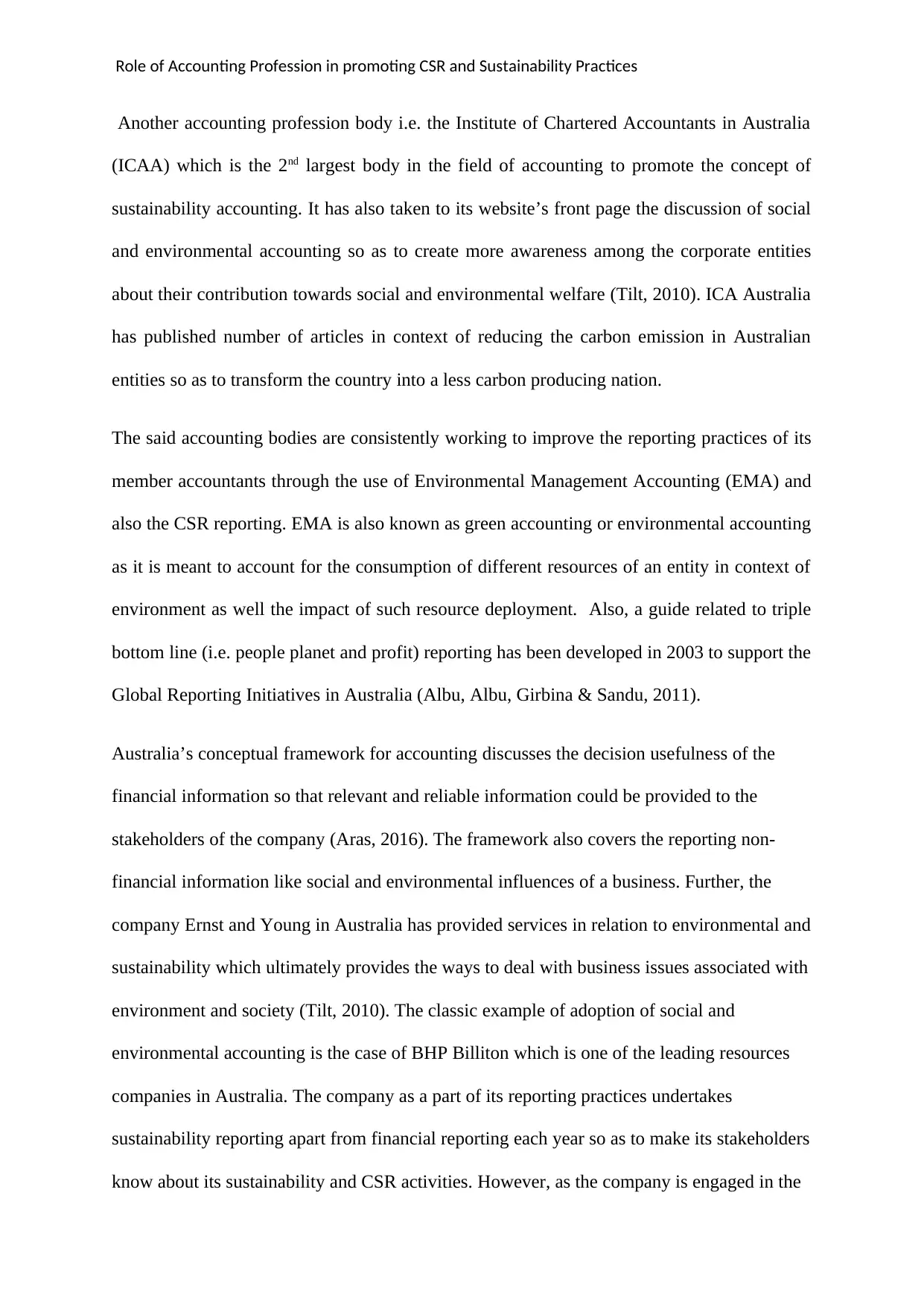
Role of Accounting Profession in promoting CSR and Sustainability Practices
Another accounting profession body i.e. the Institute of Chartered Accountants in Australia
(ICAA) which is the 2nd largest body in the field of accounting to promote the concept of
sustainability accounting. It has also taken to its website’s front page the discussion of social
and environmental accounting so as to create more awareness among the corporate entities
about their contribution towards social and environmental welfare (Tilt, 2010). ICA Australia
has published number of articles in context of reducing the carbon emission in Australian
entities so as to transform the country into a less carbon producing nation.
The said accounting bodies are consistently working to improve the reporting practices of its
member accountants through the use of Environmental Management Accounting (EMA) and
also the CSR reporting. EMA is also known as green accounting or environmental accounting
as it is meant to account for the consumption of different resources of an entity in context of
environment as well the impact of such resource deployment. Also, a guide related to triple
bottom line (i.e. people planet and profit) reporting has been developed in 2003 to support the
Global Reporting Initiatives in Australia (Albu, Albu, Girbina & Sandu, 2011).
Australia’s conceptual framework for accounting discusses the decision usefulness of the
financial information so that relevant and reliable information could be provided to the
stakeholders of the company (Aras, 2016). The framework also covers the reporting non-
financial information like social and environmental influences of a business. Further, the
company Ernst and Young in Australia has provided services in relation to environmental and
sustainability which ultimately provides the ways to deal with business issues associated with
environment and society (Tilt, 2010). The classic example of adoption of social and
environmental accounting is the case of BHP Billiton which is one of the leading resources
companies in Australia. The company as a part of its reporting practices undertakes
sustainability reporting apart from financial reporting each year so as to make its stakeholders
know about its sustainability and CSR activities. However, as the company is engaged in the
Another accounting profession body i.e. the Institute of Chartered Accountants in Australia
(ICAA) which is the 2nd largest body in the field of accounting to promote the concept of
sustainability accounting. It has also taken to its website’s front page the discussion of social
and environmental accounting so as to create more awareness among the corporate entities
about their contribution towards social and environmental welfare (Tilt, 2010). ICA Australia
has published number of articles in context of reducing the carbon emission in Australian
entities so as to transform the country into a less carbon producing nation.
The said accounting bodies are consistently working to improve the reporting practices of its
member accountants through the use of Environmental Management Accounting (EMA) and
also the CSR reporting. EMA is also known as green accounting or environmental accounting
as it is meant to account for the consumption of different resources of an entity in context of
environment as well the impact of such resource deployment. Also, a guide related to triple
bottom line (i.e. people planet and profit) reporting has been developed in 2003 to support the
Global Reporting Initiatives in Australia (Albu, Albu, Girbina & Sandu, 2011).
Australia’s conceptual framework for accounting discusses the decision usefulness of the
financial information so that relevant and reliable information could be provided to the
stakeholders of the company (Aras, 2016). The framework also covers the reporting non-
financial information like social and environmental influences of a business. Further, the
company Ernst and Young in Australia has provided services in relation to environmental and
sustainability which ultimately provides the ways to deal with business issues associated with
environment and society (Tilt, 2010). The classic example of adoption of social and
environmental accounting is the case of BHP Billiton which is one of the leading resources
companies in Australia. The company as a part of its reporting practices undertakes
sustainability reporting apart from financial reporting each year so as to make its stakeholders
know about its sustainability and CSR activities. However, as the company is engaged in the
⊘ This is a preview!⊘
Do you want full access?
Subscribe today to unlock all pages.

Trusted by 1+ million students worldwide
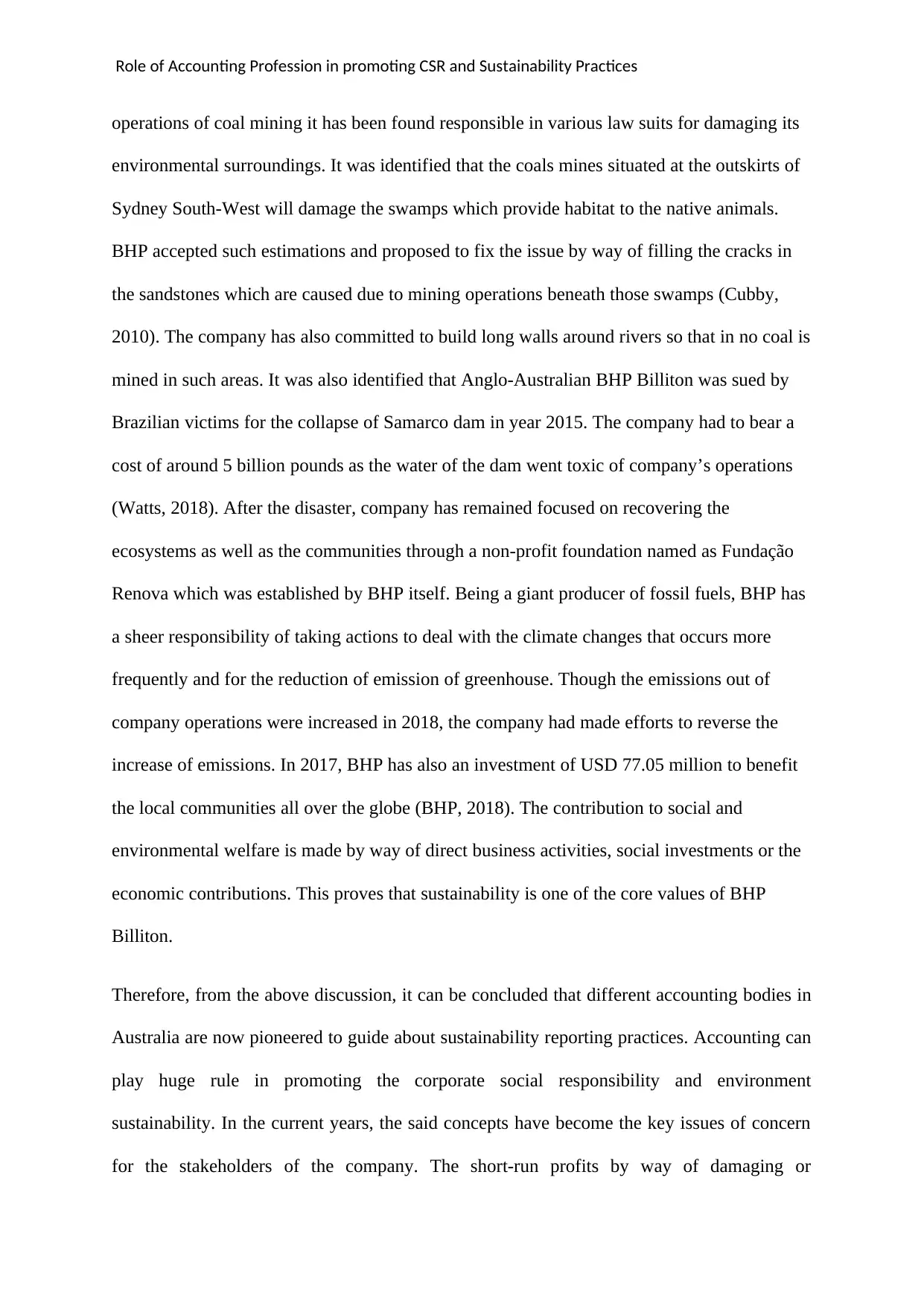
Role of Accounting Profession in promoting CSR and Sustainability Practices
operations of coal mining it has been found responsible in various law suits for damaging its
environmental surroundings. It was identified that the coals mines situated at the outskirts of
Sydney South-West will damage the swamps which provide habitat to the native animals.
BHP accepted such estimations and proposed to fix the issue by way of filling the cracks in
the sandstones which are caused due to mining operations beneath those swamps (Cubby,
2010). The company has also committed to build long walls around rivers so that in no coal is
mined in such areas. It was also identified that Anglo-Australian BHP Billiton was sued by
Brazilian victims for the collapse of Samarco dam in year 2015. The company had to bear a
cost of around 5 billion pounds as the water of the dam went toxic of company’s operations
(Watts, 2018). After the disaster, company has remained focused on recovering the
ecosystems as well as the communities through a non-profit foundation named as Fundação
Renova which was established by BHP itself. Being a giant producer of fossil fuels, BHP has
a sheer responsibility of taking actions to deal with the climate changes that occurs more
frequently and for the reduction of emission of greenhouse. Though the emissions out of
company operations were increased in 2018, the company had made efforts to reverse the
increase of emissions. In 2017, BHP has also an investment of USD 77.05 million to benefit
the local communities all over the globe (BHP, 2018). The contribution to social and
environmental welfare is made by way of direct business activities, social investments or the
economic contributions. This proves that sustainability is one of the core values of BHP
Billiton.
Therefore, from the above discussion, it can be concluded that different accounting bodies in
Australia are now pioneered to guide about sustainability reporting practices. Accounting can
play huge rule in promoting the corporate social responsibility and environment
sustainability. In the current years, the said concepts have become the key issues of concern
for the stakeholders of the company. The short-run profits by way of damaging or
operations of coal mining it has been found responsible in various law suits for damaging its
environmental surroundings. It was identified that the coals mines situated at the outskirts of
Sydney South-West will damage the swamps which provide habitat to the native animals.
BHP accepted such estimations and proposed to fix the issue by way of filling the cracks in
the sandstones which are caused due to mining operations beneath those swamps (Cubby,
2010). The company has also committed to build long walls around rivers so that in no coal is
mined in such areas. It was also identified that Anglo-Australian BHP Billiton was sued by
Brazilian victims for the collapse of Samarco dam in year 2015. The company had to bear a
cost of around 5 billion pounds as the water of the dam went toxic of company’s operations
(Watts, 2018). After the disaster, company has remained focused on recovering the
ecosystems as well as the communities through a non-profit foundation named as Fundação
Renova which was established by BHP itself. Being a giant producer of fossil fuels, BHP has
a sheer responsibility of taking actions to deal with the climate changes that occurs more
frequently and for the reduction of emission of greenhouse. Though the emissions out of
company operations were increased in 2018, the company had made efforts to reverse the
increase of emissions. In 2017, BHP has also an investment of USD 77.05 million to benefit
the local communities all over the globe (BHP, 2018). The contribution to social and
environmental welfare is made by way of direct business activities, social investments or the
economic contributions. This proves that sustainability is one of the core values of BHP
Billiton.
Therefore, from the above discussion, it can be concluded that different accounting bodies in
Australia are now pioneered to guide about sustainability reporting practices. Accounting can
play huge rule in promoting the corporate social responsibility and environment
sustainability. In the current years, the said concepts have become the key issues of concern
for the stakeholders of the company. The short-run profits by way of damaging or
Paraphrase This Document
Need a fresh take? Get an instant paraphrase of this document with our AI Paraphraser
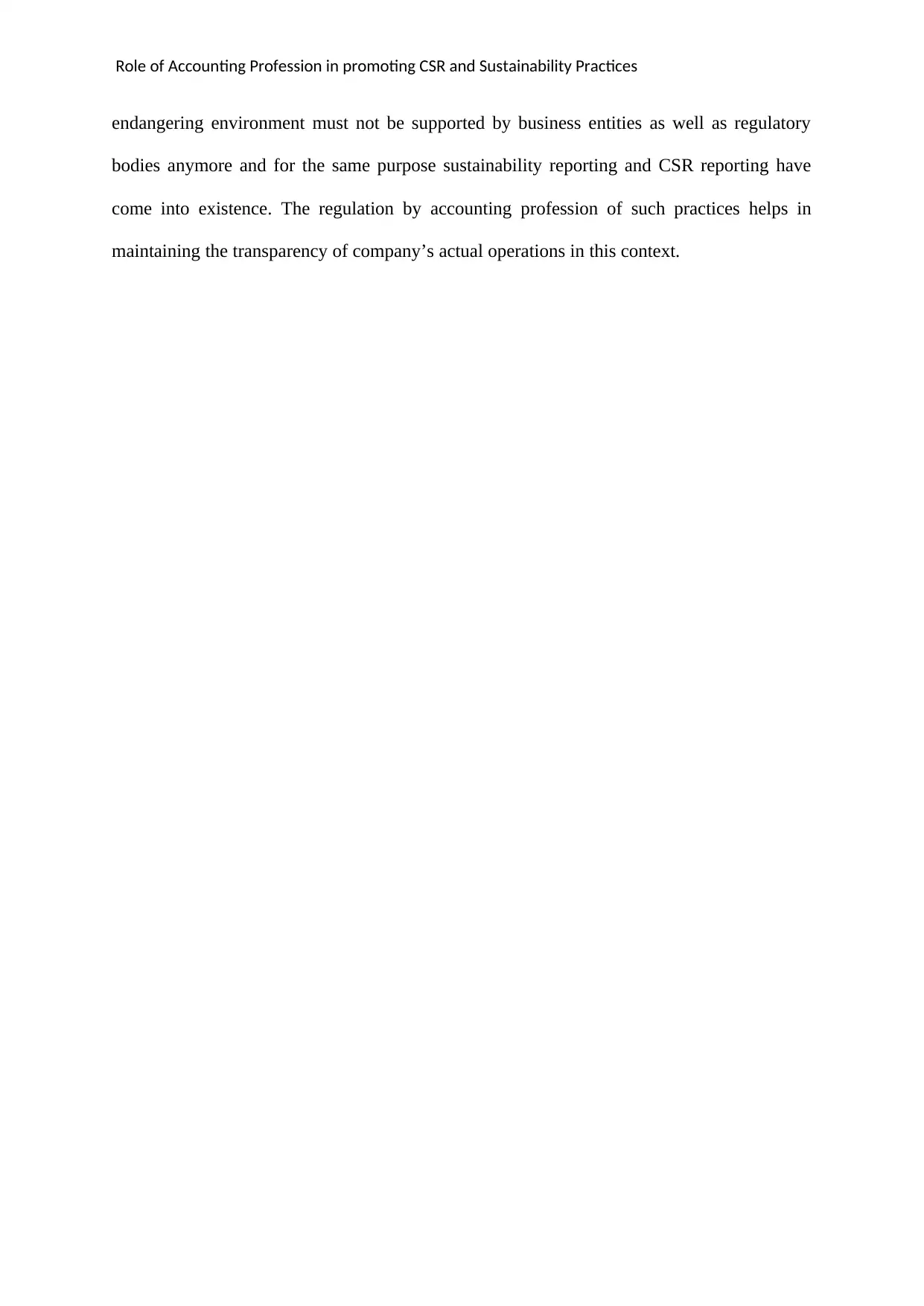
Role of Accounting Profession in promoting CSR and Sustainability Practices
endangering environment must not be supported by business entities as well as regulatory
bodies anymore and for the same purpose sustainability reporting and CSR reporting have
come into existence. The regulation by accounting profession of such practices helps in
maintaining the transparency of company’s actual operations in this context.
endangering environment must not be supported by business entities as well as regulatory
bodies anymore and for the same purpose sustainability reporting and CSR reporting have
come into existence. The regulation by accounting profession of such practices helps in
maintaining the transparency of company’s actual operations in this context.
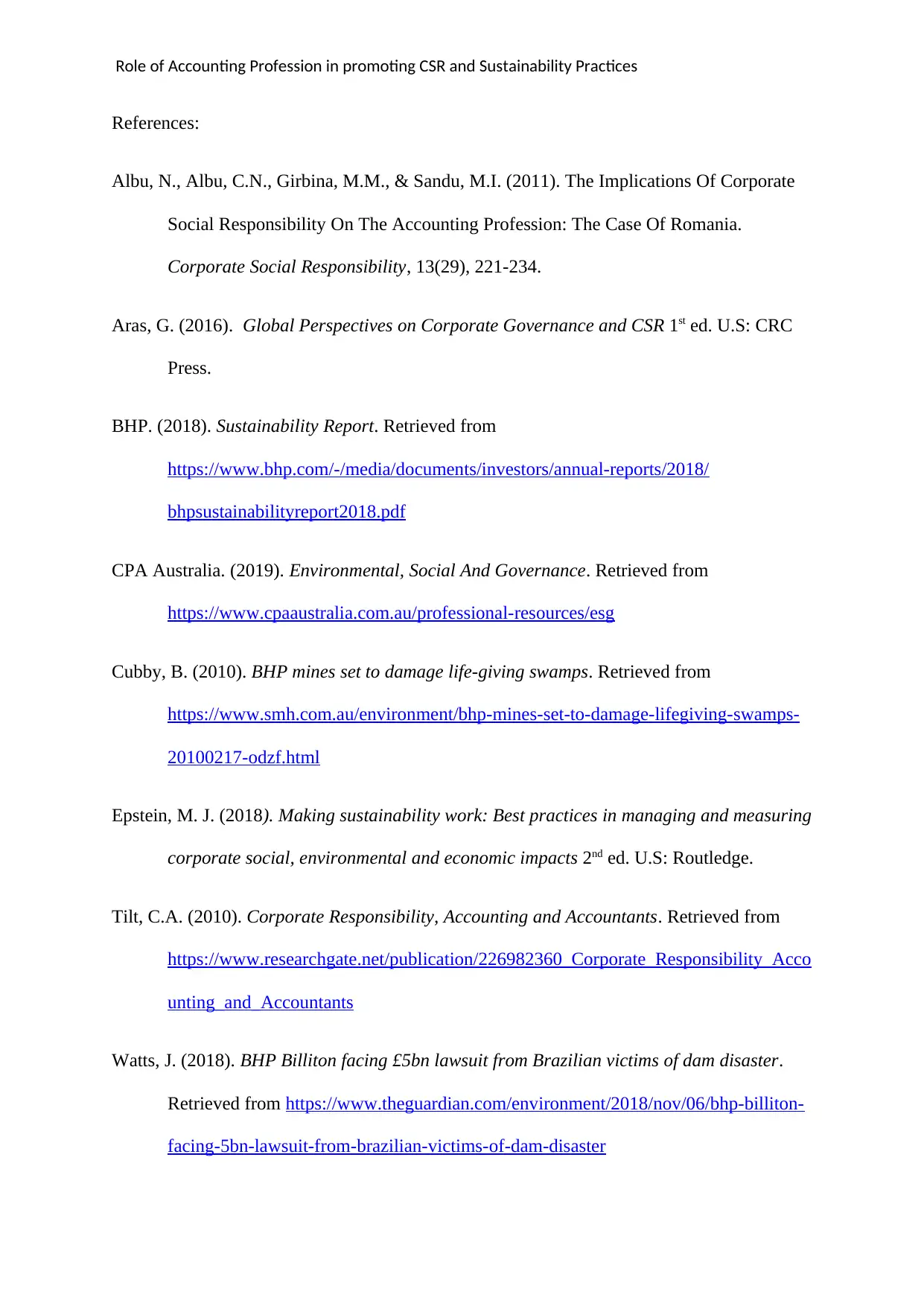
Role of Accounting Profession in promoting CSR and Sustainability Practices
References:
Albu, N., Albu, C.N., Girbina, M.M., & Sandu, M.I. (2011). The Implications Of Corporate
Social Responsibility On The Accounting Profession: The Case Of Romania.
Corporate Social Responsibility, 13(29), 221-234.
Aras, G. (2016). Global Perspectives on Corporate Governance and CSR 1st ed. U.S: CRC
Press.
BHP. (2018). Sustainability Report. Retrieved from
https://www.bhp.com/-/media/documents/investors/annual-reports/2018/
bhpsustainabilityreport2018.pdf
CPA Australia. (2019). Environmental, Social And Governance. Retrieved from
https://www.cpaaustralia.com.au/professional-resources/esg
Cubby, B. (2010). BHP mines set to damage life-giving swamps. Retrieved from
https://www.smh.com.au/environment/bhp-mines-set-to-damage-lifegiving-swamps-
20100217-odzf.html
Epstein, M. J. (2018). Making sustainability work: Best practices in managing and measuring
corporate social, environmental and economic impacts 2nd ed. U.S: Routledge.
Tilt, C.A. (2010). Corporate Responsibility, Accounting and Accountants. Retrieved from
https://www.researchgate.net/publication/226982360_Corporate_Responsibility_Acco
unting_and_Accountants
Watts, J. (2018). BHP Billiton facing £5bn lawsuit from Brazilian victims of dam disaster.
Retrieved from https://www.theguardian.com/environment/2018/nov/06/bhp-billiton-
facing-5bn-lawsuit-from-brazilian-victims-of-dam-disaster
References:
Albu, N., Albu, C.N., Girbina, M.M., & Sandu, M.I. (2011). The Implications Of Corporate
Social Responsibility On The Accounting Profession: The Case Of Romania.
Corporate Social Responsibility, 13(29), 221-234.
Aras, G. (2016). Global Perspectives on Corporate Governance and CSR 1st ed. U.S: CRC
Press.
BHP. (2018). Sustainability Report. Retrieved from
https://www.bhp.com/-/media/documents/investors/annual-reports/2018/
bhpsustainabilityreport2018.pdf
CPA Australia. (2019). Environmental, Social And Governance. Retrieved from
https://www.cpaaustralia.com.au/professional-resources/esg
Cubby, B. (2010). BHP mines set to damage life-giving swamps. Retrieved from
https://www.smh.com.au/environment/bhp-mines-set-to-damage-lifegiving-swamps-
20100217-odzf.html
Epstein, M. J. (2018). Making sustainability work: Best practices in managing and measuring
corporate social, environmental and economic impacts 2nd ed. U.S: Routledge.
Tilt, C.A. (2010). Corporate Responsibility, Accounting and Accountants. Retrieved from
https://www.researchgate.net/publication/226982360_Corporate_Responsibility_Acco
unting_and_Accountants
Watts, J. (2018). BHP Billiton facing £5bn lawsuit from Brazilian victims of dam disaster.
Retrieved from https://www.theguardian.com/environment/2018/nov/06/bhp-billiton-
facing-5bn-lawsuit-from-brazilian-victims-of-dam-disaster
⊘ This is a preview!⊘
Do you want full access?
Subscribe today to unlock all pages.

Trusted by 1+ million students worldwide
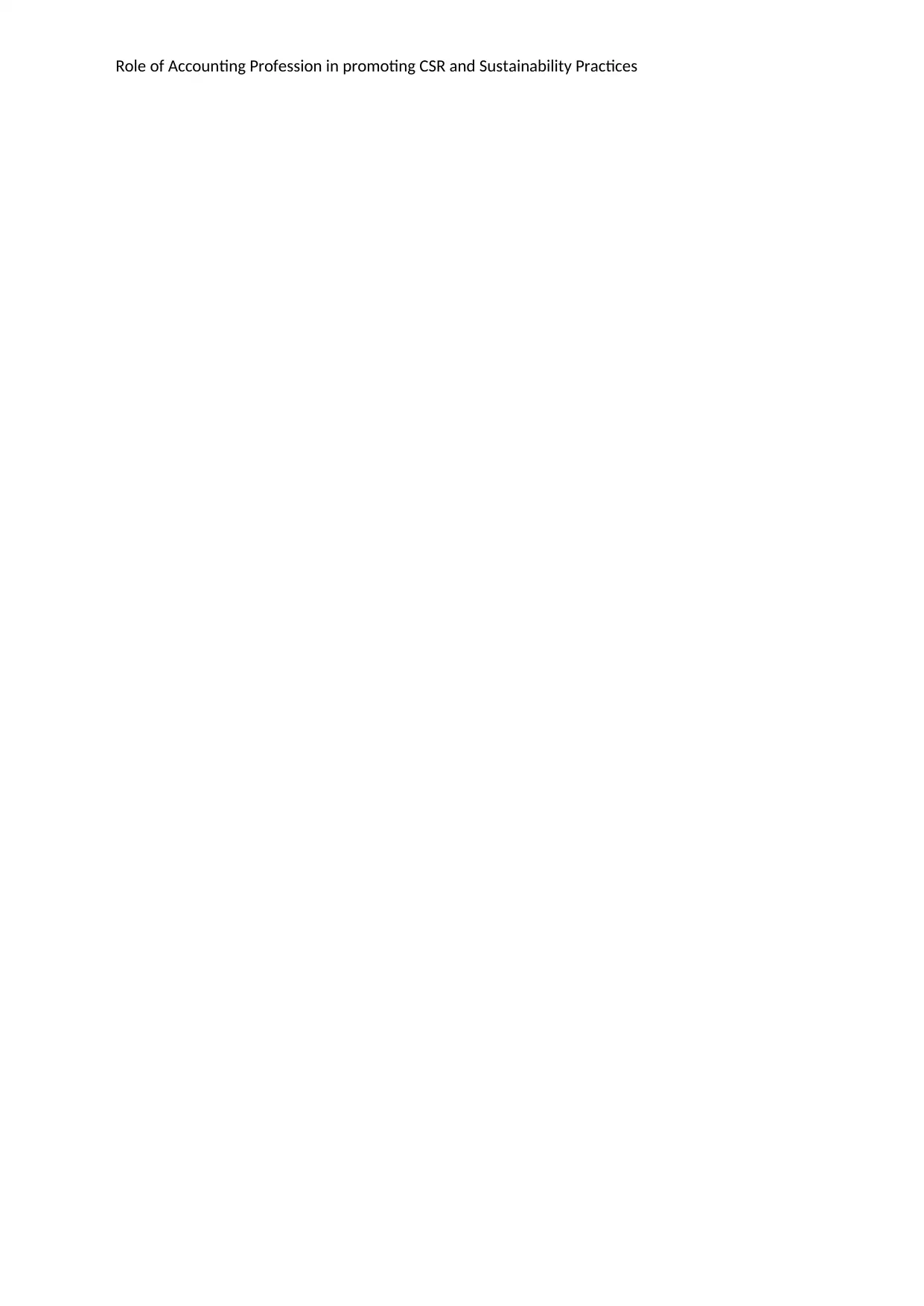
Role of Accounting Profession in promoting CSR and Sustainability Practices
1 out of 7
Related Documents
Your All-in-One AI-Powered Toolkit for Academic Success.
+13062052269
info@desklib.com
Available 24*7 on WhatsApp / Email
![[object Object]](/_next/static/media/star-bottom.7253800d.svg)
Unlock your academic potential
Copyright © 2020–2026 A2Z Services. All Rights Reserved. Developed and managed by ZUCOL.




